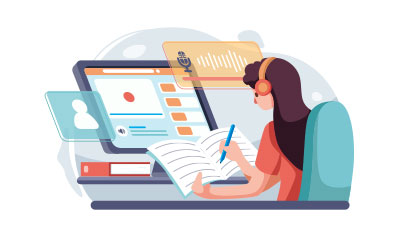Every student is different. No two have a similar learning style! Even the availability of time, as well as resources for each one of them, is different. So how can it be justified to provide them all the same kind of education! The concept of one-size-fits-all regarding imparting education to students overlooks the individual requirements of each student. Many online courses for kids and coding classes offer the same level of teaching to kids of different age groups. Ignitepad follows customized teaching methods.
To meet the demands of customized learning, contemporary methods of teaching and learning like adaptive and personalized, have been created to help deal with blanket curriculums that do not impart specialized learning styles. Although people often confuse one with the other, adaptive and personalized learning methods are different from each other. If sketching the picture of the two types of learning in the mind is not possible for you, let’s take a look at them in detail.
Adaptive Learning
The adaptive learning approach is tech-enabled learning. It sometimes makes use of artificial intelligence (AI) algorithms to design a learning method as per a learner's requirement depending on their pace of progress. For instance, dance classes or piano classes for kids can be conducted using AIs.
Adaptive learning gives real-time feedback. It provides study material that is neither too difficult nor easy to follow. Overall, it positions a learner in the optimum zone wherein everything is taken care of in a moderate amount.
A learner can continue learning at their specific pace independently sans any feedback from their instructor or tutor. There is also the provision of switching the content or the format that suits their need depending on their inputs. It makes the teaching automatic. The onus to teach the right content to the student's shifts from the instructor to the technology. The agenda is to teach the learner exactly what they need without wasting time and retaining information.
Although it may sound like an ideal situation, this AI-dependent adaptive method of learning and teaching has its share of setbacks. The biggest issue is that automated systems are not fully prepared to manage ever-adjusting as well as constantly evolving changes without any kind of human involvement.
More defined problems include:
∙ As the AI approach is dependent on collecting personal data, it gives birth to privacy concerns.
∙ There still are so many aspects of learning that cannot be measured, for instance, measuring eye contact, etc. This may make the AI system fail or not work in favor of the learner all the time. A human-based approach would be more flexible and accurate.
∙ As it is a tech-enabled system, technical know-how is a must for the learner. Also, there is room for the system to collapse.
∙ The missing human connection can have its repercussions; mental and emotional.
∙ Limited flexibility of AI can lead to insecurity.
∙ The collection of data by the AI comprises a lot of questioning, quizzing, testing, and playing undesired games, which may distract, mislead or exhaust the learner.
∙ The system is prone to picking up inaccurate information depending on the saved previous data.
This implies that adaptive learning cannot be a permanent solution. It is only suitable for certain circumstances because of its limitations. Personalized learning can be explored by those learners who are looking for flexibility.
Personalized Learning
Personalized learning is instructor-based learning that does not provide one learning method to all students. This method imparts education to students based on their skills, interests, strengths, and needs. The same course may be completed by a learner in just a month while other learners may take several months. In this method, by allowing the learner to ascertain the pace of their learning, the instructor is enabling them to take up ownership of their education.
Both children and adults can enhance their skills through personalized learning and farewell academically or in their careers. There are many different ways of imparting personalized education and the most common among them is the online classes.
Considering the prevalent situation, the most sought-after methods of learning are online courses that are similar to traditional physical classrooms, wherein the learners get to listen to a lecture at the same time have the ability for discourse. Online tuitions are proved to be the most preferred form of personalized learning. Ignitepad Online tutors are the best.
∙ Online tutors solve any problem.
∙ Online tutors offer personalized attention.
∙ Online tutors for specific subjects tend to give real-life examples that are more beneficial for learners.
∙ They teach things beyond the textbook module.
∙ They are more flexible to the learner’s needs and demands.
Although experts and industry insiders may predict automation and AI to be the future of education, the ground reality remains the same. Teaching or learning is something that cannot be automated completely, human involvement is necessary which is also vital for the over development of young students. The adaptive learning approach does not appear to surpass the personalized learning approach; at least, not anytime soon!
Also, Read:
Benefits of Blended Learning Methods
The Importance of Fun Brain Games for Kids’ Development


